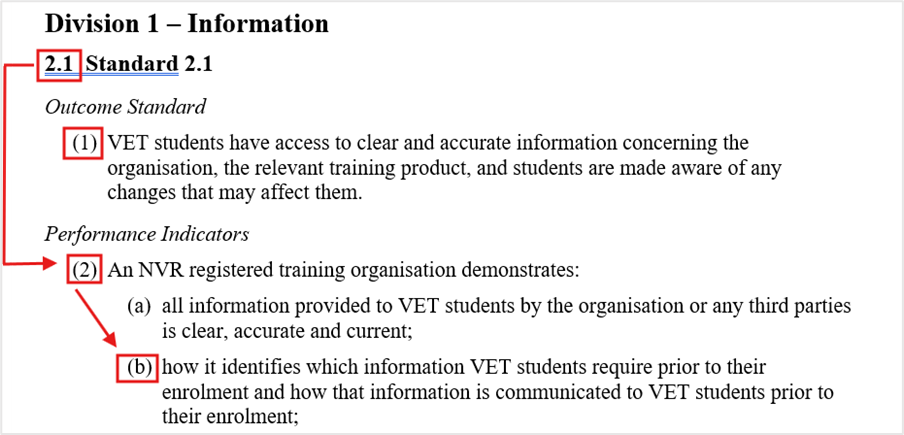Standards for RTOs
Revisions to the Standards for RTOs 2015 are now final - new requirements in place
On 20.8.25 the DEWR website updated to change the information about the three components of the Standards. The Compliance Requirements are now known as Compliance Standards. We have reflected this change below. A link to our social media post showing the change is here.
In practical terms, when referencing the Standards, consider now that there are two different sets. While we typically refer to "Standard 1.3" meaning Outcome Standard 1.3, there is now the consideration that "Standard XYZ" may refer to an Outcome Standard or a Compliance Standard. The key will be to note the numbering convention as the Compliance Standards start from the number 7. The highest Outcome Standard is 4.4.
Regarding the numbering convention of the Outcome Standards, note that the legislative instrument is the official and enforceable account of requirements. Communications from DEWR confirm that providers should be referring to the legislative instrument over the Policy Document.
This means the numbering of the Outcome Standards follows the convention of that in the instrument found on the Federal Register of Legislation:

For example, Outcome Standard 2.1.2b; not 2.1b as found in the Policy Document. Notably, it is frustrating that ASQA is inconsistent with the DEWR advice about numbering. Email us if you'd like a copy of the communications from DEWR about numbering the Outcome Standards.
It is noted that DEWR and ASQA are referring to the revised Standards as 2025 Standards for RTOs. Not Standards for RTOs 2025.
The Training Accreditation Council in Western Australia has announced that for all providers under their jurisdiction, a three month transition period from 1.10.25 until 31.12.25 is in place, with commencement of the Registration Standards 2025 WA from 1 January 2026. For more information about the TAC Registration Standards, see their website.
The ‘revised Standards’ are comprised of three parts:
All three (3) components of the Standards must be read in conjunction with each other. And at times, with reference to other, noted legislation.
RTOs are required to comply with the requirements across all documents to maintain registration.

The official names for these and links for where they are found are:
Outcome Standards -
National Vocational Education and Training Regulator (Outcome Standards for Registered Training Organisations) Instrument 2025: https://www.legislation.gov.au/F2025L00354/asmade/text
Compliance Standards -
National Vocational Education and Training Regulator (Compliance Standards for NVR Registered Training Organisations and Fit and Proper Person Requirements) Instrument 2025: https://www.legislation.gov.au/F2025L00355/asmade/text
In addition to the legislative instruments, there are a number of documents to support interpretation.
The current list is here:
From DEWR
NB: DEWR have confirmed "the Policy Guidance is not an enforceable legislative instrument and does not impose legal obligations. The Policy Guidance was developed to support training providers, trainers and assessors in understanding the intent behind changes to the revised Standards."
Outcome Standards:
Compliance Standards:
ASQA Practice Guides:
ASQA have completed nineteen (19) Practice Guides to assist RTOs to interpret the new requirements. Noting, the legislative instruments and Credential Policy are the requirements.
You can see the Practice Guides on the ASQA website or download all 19 at once from here.
From ASQA:
NB: ASQA have confirmed "that the Practice Guides are supplementary support and ASQA does not intend that the Practice Guides hold legal or compliance obligations for RTOs."
"...they do provide examples of how to meet the standards and illustrate potential risks to quality outcomes..."
ASQA Workshops for Providers:
The Outcome Standards contain the areas for quality delivery of training and assessment, including the standards of performance required to achieve the necessary outcomes, and the indicators for performance that RTOs must demonstrate in order for the regulator to consider compliance at the standard level.
RTOs must act under their own self-assurance model to demonstrate to the regulator how they are meeting the requirements of the Outcome Standards in the context of their operations.
The Compliance Standards contain the administrative requirements that must be met by RTOs in order that their registration is maintained. This document contains a section called "Compliance Requirements".
This is a prescriptive document. It stipulates what can and cannot happen.
The Compliance Requirements deal with:
Marketing and information shared by the RTO
Issuance and record keeping of AQF certification documentation
Retention of records (‘certificates’ and assessments)
Student identifier requirements
Use of the Nationally Recognised Training (NRT) logo
Transition arrangements
Annual declaration on compliance
Notification of material changes
Third-party arrangements
Pre-paid fee protection, insurance, and compliance with laws
The Fit and Proper Person Requirements and the NRT Logo Conditions of Use Policy are contained in the Compliance Standards as Schedules 1 and 2 respectively.
The Credential Policy stipulates the credentials required to undertake various activities in VET. It deals with requirements to:
Deliver and/or assess VET qualifications
Deliver and/or assess TAE qualifications
Participate in or lead assessment validation
Work under direction (and the allowable circumstances for this)
Provide direction (and the allowable circumstances for this)
The Credential Policy is a prescriptive document. It stipulates what is, and what is not, allowable.
A series of information sessions are ongoing for Education Matters members to:
Run through the:
New documents
Changes
Potential implications
Suggested next steps
Disseminate the suite of newly developed resources/guides to support transition to the new requirements
Discuss changes and strategic approaches
There is a substantial body of work ahead to effectively analyse and implement requirements in the updated Standards, and we look forward to continuing to support you along the way!
Refer to these websites for more:
